TRENDING
The Worst Common Foods For Your Health
Published
2 years agoon
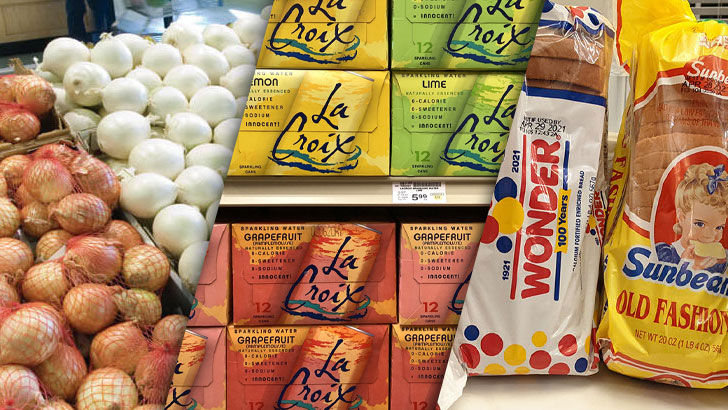 Unfortunately, many of the commonly eaten foods that we consume on a daily basis can lead to long-term health issues if not consumed in moderation or avoided altogether. While some products are obviously harmful, others may not be as apparent, but excessive consumption can result in severe side effects. To ensure good health, it is essential to make wise choices about the foods we eat, and here are some we should definitely think about avoiding more often.
Unfortunately, many of the commonly eaten foods that we consume on a daily basis can lead to long-term health issues if not consumed in moderation or avoided altogether. While some products are obviously harmful, others may not be as apparent, but excessive consumption can result in severe side effects. To ensure good health, it is essential to make wise choices about the foods we eat, and here are some we should definitely think about avoiding more often.
Diet Cola
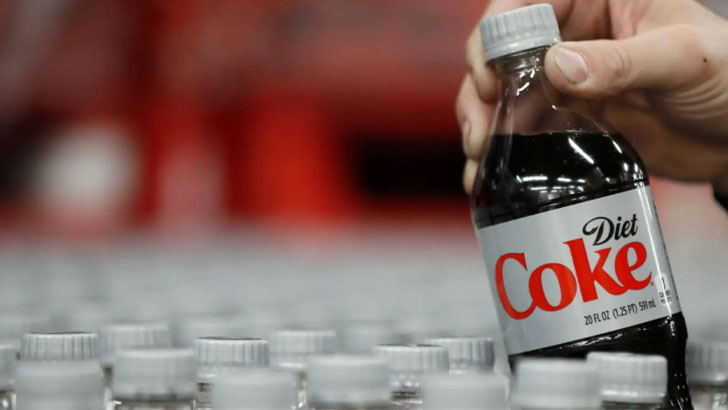 While diet cola is often touted as a healthy alternative to regular soda due to its lack of sugar and calories, studies have shown that it may not be as beneficial as advertised. Excessive consumption of diet cola, which contains artificial sweeteners, can lead to a host of health problems, including chronic kidney disease, tooth decay, osteoporosis, depression, and heart disease. Although further research is needed, it may be wise to limit or completely avoid the consumption of diet cola to ensure optimal health.
While diet cola is often touted as a healthy alternative to regular soda due to its lack of sugar and calories, studies have shown that it may not be as beneficial as advertised. Excessive consumption of diet cola, which contains artificial sweeteners, can lead to a host of health problems, including chronic kidney disease, tooth decay, osteoporosis, depression, and heart disease. Although further research is needed, it may be wise to limit or completely avoid the consumption of diet cola to ensure optimal health.
Hot Dogs
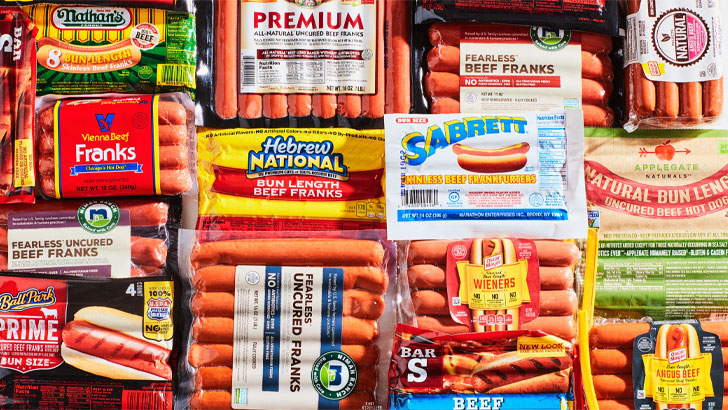 Hot dogs are highly processed foods that contain various ingredients aside from animal meat, including maltodextrin, which can cause harm to the stomach and intestines if consumed in excess. Moreover, a single serving of hot dogs can contain up to 33% of the recommended daily intake of sodium, and the use of vague terms like “poultry meat” in their ingredients list raises concerns about the true origin of the meat they contain. Despite these issues, hot dogs remain a popular food item and are sold in large quantities each year at stores such as Kroger.
Hot dogs are highly processed foods that contain various ingredients aside from animal meat, including maltodextrin, which can cause harm to the stomach and intestines if consumed in excess. Moreover, a single serving of hot dogs can contain up to 33% of the recommended daily intake of sodium, and the use of vague terms like “poultry meat” in their ingredients list raises concerns about the true origin of the meat they contain. Despite these issues, hot dogs remain a popular food item and are sold in large quantities each year at stores such as Kroger.
Breakfast Sandwiches
 While it may be convenient to grab a breakfast sandwich from popular fast-food chains, consuming these sandwiches daily will harm your health. Although they are undeniably delicious, breakfast sandwiches are high in cholesterol, and eating them three times a week can lead to weight gain of up to eight pounds a year. This is due to the additional three hundred calories that come from the sandwich, which would not be consumed if you opted for a traditionally-cooked breakfast instead. The next time you consider a McDonald’s McMuffin, you may want to think twice.
While it may be convenient to grab a breakfast sandwich from popular fast-food chains, consuming these sandwiches daily will harm your health. Although they are undeniably delicious, breakfast sandwiches are high in cholesterol, and eating them three times a week can lead to weight gain of up to eight pounds a year. This is due to the additional three hundred calories that come from the sandwich, which would not be consumed if you opted for a traditionally-cooked breakfast instead. The next time you consider a McDonald’s McMuffin, you may want to think twice.
Cheese Slices
 Imitation cheese is often sold with misleading packaging, as it is made with ingredients such as vegetable oils, trans fats, flavorings, and preservatives, rather than milk fat like real cheese. These additives make imitation cheese significantly less healthy than authentic cheese, and it can often be identified by its considerably lower price point. Choosing real cheese over imitation cheese is a healthier option for those who prioritize their wellbeing, as it provides a more natural and nutrient-dense source of dairy.
Imitation cheese is often sold with misleading packaging, as it is made with ingredients such as vegetable oils, trans fats, flavorings, and preservatives, rather than milk fat like real cheese. These additives make imitation cheese significantly less healthy than authentic cheese, and it can often be identified by its considerably lower price point. Choosing real cheese over imitation cheese is a healthier option for those who prioritize their wellbeing, as it provides a more natural and nutrient-dense source of dairy.
Processed Salad Dressings
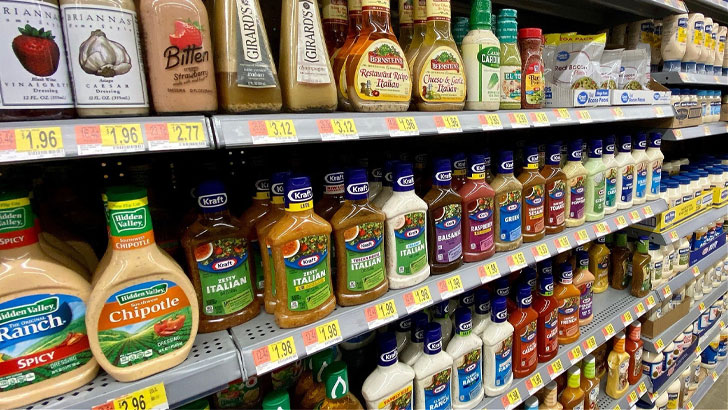 Although vegetables are a super healthy food choice, many of them don’t have the most appealing taste on their own. Salad dressings can enhance the flavor of a salad, but the use of commercial salad dressings may be counterproductive to the health benefits of the salad. This is because many commercial salad dressings contain unhealthy ingredients like vegetable oils, sugar, and trans fats, as well as artificial chemicals. Making your own salad dressing from simple ingredients like olive oil, vinegar, salt, and pepper is a healthier option. It’s important to take a closer look at the labels of store-bought salad dressings to ensure that they don’t contain unhealthy additives.
Although vegetables are a super healthy food choice, many of them don’t have the most appealing taste on their own. Salad dressings can enhance the flavor of a salad, but the use of commercial salad dressings may be counterproductive to the health benefits of the salad. This is because many commercial salad dressings contain unhealthy ingredients like vegetable oils, sugar, and trans fats, as well as artificial chemicals. Making your own salad dressing from simple ingredients like olive oil, vinegar, salt, and pepper is a healthier option. It’s important to take a closer look at the labels of store-bought salad dressings to ensure that they don’t contain unhealthy additives.
Packaged Cupcakes
 While pre-packaged cupcakes might be a tempting dessert, their nutritional content could lead to negative health consequences. Typically, these packs contain nearly three times the recommended daily value of sugar and high fructose corn syrup, which can contribute to high blood pressure, metabolic syndrome, obesity, diabetes, and fatty liver. Therefore, it’s crucial to eat these cupcakes in moderation to avoid potential health issues.
While pre-packaged cupcakes might be a tempting dessert, their nutritional content could lead to negative health consequences. Typically, these packs contain nearly three times the recommended daily value of sugar and high fructose corn syrup, which can contribute to high blood pressure, metabolic syndrome, obesity, diabetes, and fatty liver. Therefore, it’s crucial to eat these cupcakes in moderation to avoid potential health issues.
Gummy Bears
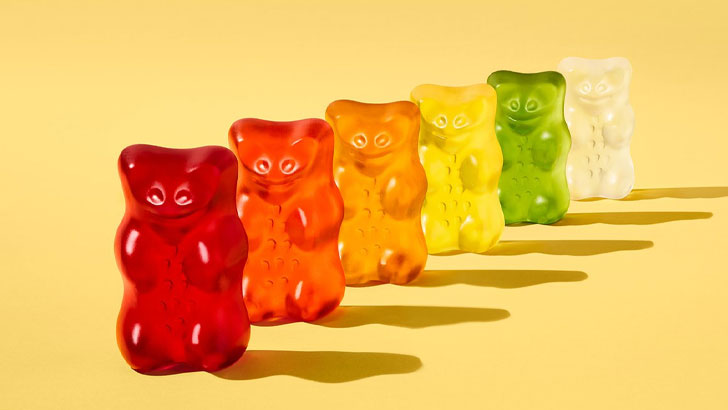 Despite their small size, each bag of gummy bears contains a significant amount of sugar, with up to 12 teaspoons, which is two to three times the recommended daily intake for children. This excessive sugar intake can lead to health problems, in addition to the presence of artificial ingredients such as petroleum-based dyes, which can contribute to the development of attention deficit or hyperactivity disorders. Although purchasing a pack of Haribo Gummy Bears from Walmart might be affordable, it is important to consider whether it is worth risking one’s health.
Despite their small size, each bag of gummy bears contains a significant amount of sugar, with up to 12 teaspoons, which is two to three times the recommended daily intake for children. This excessive sugar intake can lead to health problems, in addition to the presence of artificial ingredients such as petroleum-based dyes, which can contribute to the development of attention deficit or hyperactivity disorders. Although purchasing a pack of Haribo Gummy Bears from Walmart might be affordable, it is important to consider whether it is worth risking one’s health.
Instant Ramen
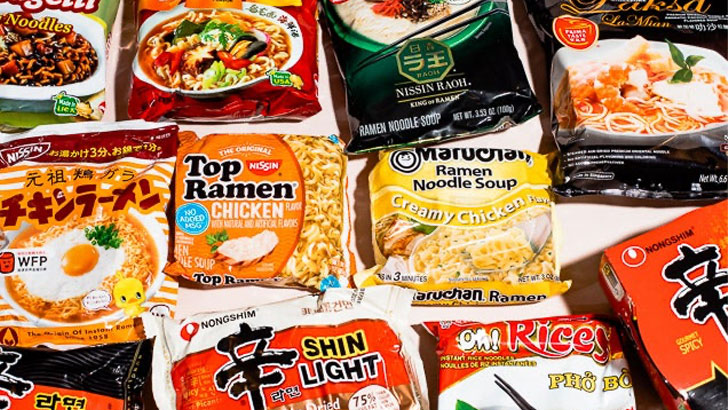 Maruchan Soup is a popular and affordable meal, costing just thirteen cents per packet and is easy to prepare. However, the low fiber content in a serving of this soup makes it unsatisfying. Additionally, the soup is high in sodium, with each container containing half the recommended daily value. Regular consumption of this soup can lead to health problems like high blood pressure and high cholesterol.
Maruchan Soup is a popular and affordable meal, costing just thirteen cents per packet and is easy to prepare. However, the low fiber content in a serving of this soup makes it unsatisfying. Additionally, the soup is high in sodium, with each container containing half the recommended daily value. Regular consumption of this soup can lead to health problems like high blood pressure and high cholesterol.
Cheap Bread
 While cheap white bread may seem like a practical choice for packing school or work lunches, it can also be addictive due to its sugar content. The fermentation process of bread requires sugar, and many brands add high amounts of fat and salt, which can be harmful to health if consumed excessively. Moreover, cheap white bread lacks fiber, which means it won’t keep you full for long. Although it costs less than a dollar per loaf, it may not be the healthiest option.
While cheap white bread may seem like a practical choice for packing school or work lunches, it can also be addictive due to its sugar content. The fermentation process of bread requires sugar, and many brands add high amounts of fat and salt, which can be harmful to health if consumed excessively. Moreover, cheap white bread lacks fiber, which means it won’t keep you full for long. Although it costs less than a dollar per loaf, it may not be the healthiest option.
Pancakes
 Pancakes are a beloved breakfast food, but unfortunately, they are not the healthiest option. These fluffy cakes tend to have high levels of salt and preservatives, which should be avoided in a balanced diet. Additionally, many pancake mixes contain trans fats, which can increase the risk of cardiovascular diseases. Some mixes even include partially hydrogenated soybean oil, which is not considered a healthy fat. Despite their delicious taste, it’s important to keep in mind that indulging in pancakes every day is not the best choice for our overall health.
Pancakes are a beloved breakfast food, but unfortunately, they are not the healthiest option. These fluffy cakes tend to have high levels of salt and preservatives, which should be avoided in a balanced diet. Additionally, many pancake mixes contain trans fats, which can increase the risk of cardiovascular diseases. Some mixes even include partially hydrogenated soybean oil, which is not considered a healthy fat. Despite their delicious taste, it’s important to keep in mind that indulging in pancakes every day is not the best choice for our overall health.
Coconut Water
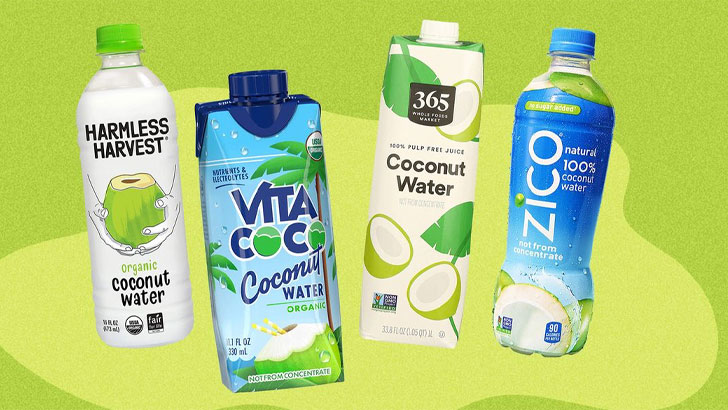 While coconut water is a great source of electrolytes and hydration, you should be cautious about it if you’re watching your calorie intake. Like many sports drinks, a single eight-ounce serving of coconut water can contain 45-60 calories. If you opt for flavored versions, they may also be high in added sugars. A third concern is that consuming too much coconut water can lead to elevated potassium levels, which can be harmful. However, this is only a risk if you drink excessive amounts. Overconsumption of this beverage can also result in stomach discomfort, so moderation is key.
While coconut water is a great source of electrolytes and hydration, you should be cautious about it if you’re watching your calorie intake. Like many sports drinks, a single eight-ounce serving of coconut water can contain 45-60 calories. If you opt for flavored versions, they may also be high in added sugars. A third concern is that consuming too much coconut water can lead to elevated potassium levels, which can be harmful. However, this is only a risk if you drink excessive amounts. Overconsumption of this beverage can also result in stomach discomfort, so moderation is key.
Chewing Gum
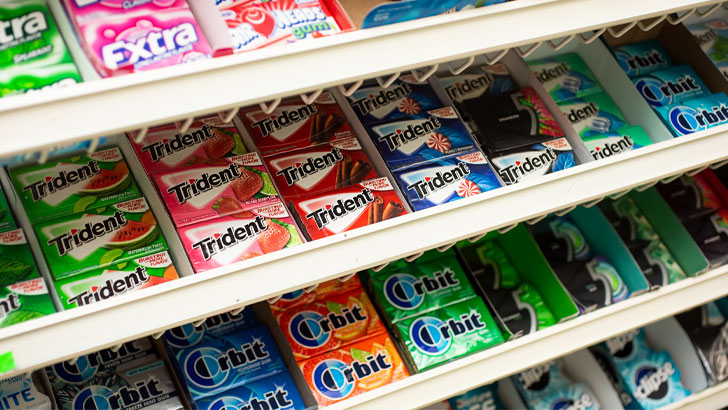 While many chewing gum brands promote benefits such as fresh breath and whiter teeth, there are some negative side effects associated with this product. Gum with high sugar content can lead to problems like stomach pain, diarrhea, and jaw pain. In addition, there have been cases of children experiencing asphyxiation from misusing gum. Before reaching for a pack of gum at the checkout line, it’s important to consider these potential risks.
While many chewing gum brands promote benefits such as fresh breath and whiter teeth, there are some negative side effects associated with this product. Gum with high sugar content can lead to problems like stomach pain, diarrhea, and jaw pain. In addition, there have been cases of children experiencing asphyxiation from misusing gum. Before reaching for a pack of gum at the checkout line, it’s important to consider these potential risks.
Sugary Cereals
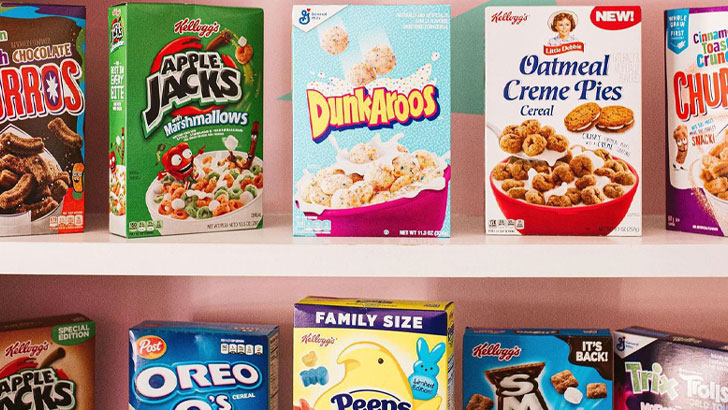 Commercialized, sugary cereals are a staple in many households, especially for families with young children. However, these cereals are often loaded with added sugar and artificial ingredients that can be harmful to our health. Most of these cereals are low in fiber, vitamins, and minerals, which are essential for a balanced diet. In addition, some brands of sugary cereals are marketed towards children, using cartoon characters and bright colors to entice them, making it difficult for parents to say no. If you’re looking for a healthier breakfast option, it’s best to opt for whole-grain cereals with low sugar content, or make your own homemade granola with natural sweeteners.
Commercialized, sugary cereals are a staple in many households, especially for families with young children. However, these cereals are often loaded with added sugar and artificial ingredients that can be harmful to our health. Most of these cereals are low in fiber, vitamins, and minerals, which are essential for a balanced diet. In addition, some brands of sugary cereals are marketed towards children, using cartoon characters and bright colors to entice them, making it difficult for parents to say no. If you’re looking for a healthier breakfast option, it’s best to opt for whole-grain cereals with low sugar content, or make your own homemade granola with natural sweeteners.
Yogurt Cups
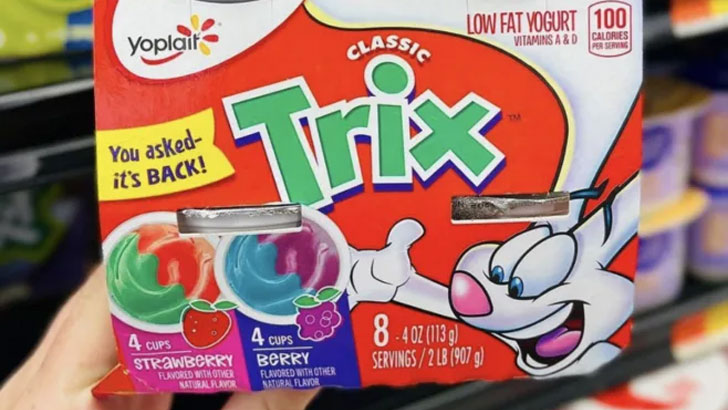 Children’s yogurt cups are marketed as healthy, but in reality, they often contain high amounts of sugar, fat, and artificial colorants. Overconsumption of these products can lead to a range of health risks, including diabetes, metabolic and heart problems, and obesity. Some of these products also contain excess fat that can become carcinogenic. Although they may contain calcium, it is important to consider the potential risks associated with consuming these sugary products.
Children’s yogurt cups are marketed as healthy, but in reality, they often contain high amounts of sugar, fat, and artificial colorants. Overconsumption of these products can lead to a range of health risks, including diabetes, metabolic and heart problems, and obesity. Some of these products also contain excess fat that can become carcinogenic. Although they may contain calcium, it is important to consider the potential risks associated with consuming these sugary products.
Hot Sauces
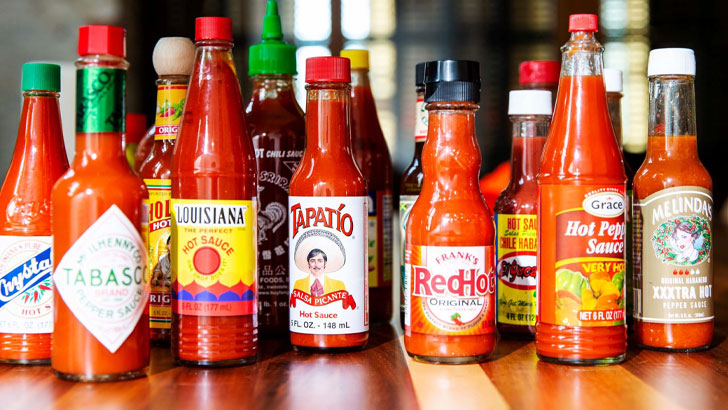 Hot sauce is undeniably a beloved condiment for many, adding a versatile flavor to a wide range of dishes. However, the very thing that makes it so appealing, its heat, can also harm our stomach lining and lead to gastritis. Despite its availability at a low price on Amazon, it’s important to exercise moderation in consuming hot sauce and be aware of its negative health effects.
Hot sauce is undeniably a beloved condiment for many, adding a versatile flavor to a wide range of dishes. However, the very thing that makes it so appealing, its heat, can also harm our stomach lining and lead to gastritis. Despite its availability at a low price on Amazon, it’s important to exercise moderation in consuming hot sauce and be aware of its negative health effects.
Coffee
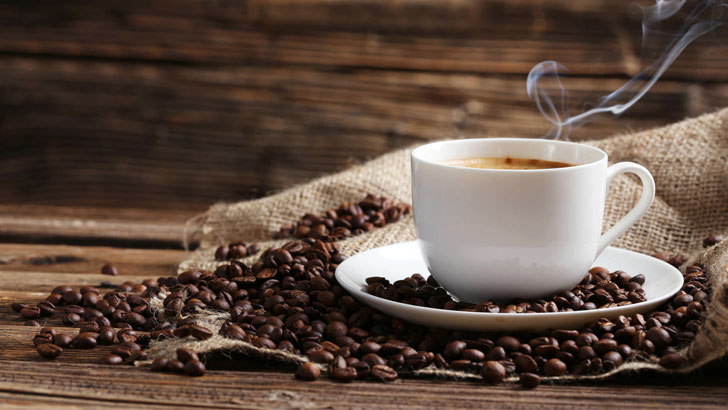 Although coffee is a beloved beverage that millions of people enjoy worldwide, excessive consumption can have negative health consequences. Consuming too much coffee can lead to sleep disorders, headaches, and exacerbate anxiety problems. Over the long term, it can even lead to cardiovascular issues. Despite these risks, coffee remains popular and widely consumed, with many people starting their day with a hot or iced cup from their favorite coffee shop. However, it’s important to be aware of the potential risks and to consume coffee in moderation.
Although coffee is a beloved beverage that millions of people enjoy worldwide, excessive consumption can have negative health consequences. Consuming too much coffee can lead to sleep disorders, headaches, and exacerbate anxiety problems. Over the long term, it can even lead to cardiovascular issues. Despite these risks, coffee remains popular and widely consumed, with many people starting their day with a hot or iced cup from their favorite coffee shop. However, it’s important to be aware of the potential risks and to consume coffee in moderation.
Meat
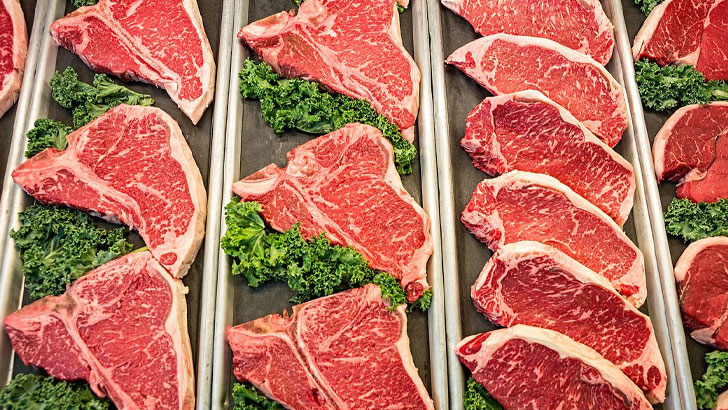 While meat is often touted as a crucial component of a balanced diet, its excessive consumption can be detrimental to our health. Animals raised for meat are often fed with pesticides and other chemicals, which can accumulate in their bodies and be passed on to humans who consume their meat. Additionally, many types of red meat contain hormones and antibiotics that are administered to animals to increase their growth rate. These hormones can potentially cause health problems in humans. Fish are not immune either, as they can contain heavy metals such as mercury. Despite these risks, companies like Tyson Foods continue to make billions. It is important to be mindful of the sources of our meat and the potential health consequences of its consumption.
While meat is often touted as a crucial component of a balanced diet, its excessive consumption can be detrimental to our health. Animals raised for meat are often fed with pesticides and other chemicals, which can accumulate in their bodies and be passed on to humans who consume their meat. Additionally, many types of red meat contain hormones and antibiotics that are administered to animals to increase their growth rate. These hormones can potentially cause health problems in humans. Fish are not immune either, as they can contain heavy metals such as mercury. Despite these risks, companies like Tyson Foods continue to make billions. It is important to be mindful of the sources of our meat and the potential health consequences of its consumption.
Flavored Popcorn
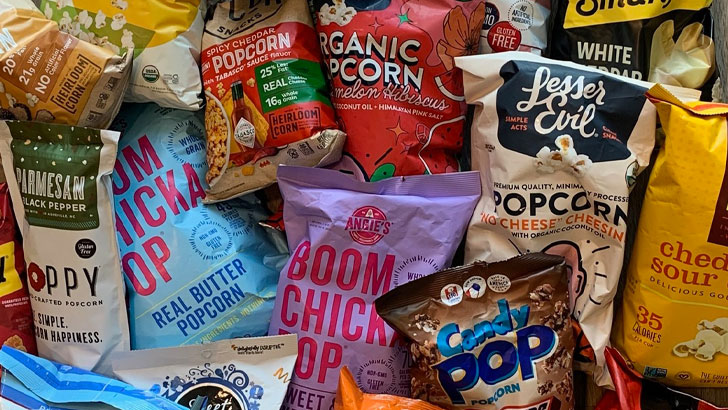 Although natural popcorn can be a healthy and delicious snack option that is low in calories, pre-packaged versions sold in supermarkets can be quite the opposite. Most are loaded with artificial flavorings and additives, such as caramel popcorn, which can be incredibly high in sugar and fat. A small bag of caramel popcorn can contain up to 12.8 tablespoons of sugar and 564 calories. It is much better to prepare this snack at home without adding any flavorings. Plus, a movie night can be just as enjoyable without the extra calories and sugar!
Although natural popcorn can be a healthy and delicious snack option that is low in calories, pre-packaged versions sold in supermarkets can be quite the opposite. Most are loaded with artificial flavorings and additives, such as caramel popcorn, which can be incredibly high in sugar and fat. A small bag of caramel popcorn can contain up to 12.8 tablespoons of sugar and 564 calories. It is much better to prepare this snack at home without adding any flavorings. Plus, a movie night can be just as enjoyable without the extra calories and sugar!
Honey
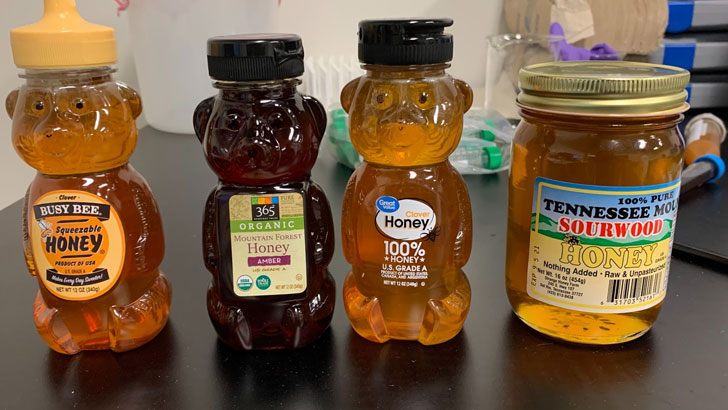 Although honey has many health benefits and is a great natural food product, it’s important to consume it in moderation due to its high sugar content. Honey is a superfood that is rich in antioxidants and can help with sore throats and cuts, but excessive sugar consumption can lead to heart disease and other harmful health conditions. Cardiologists and nutrition experts warn against consuming too much sugar, as it can be detrimental to your health. So, while honey can be a great addition to your diet, it’s important to be mindful of how much you consume.
Although honey has many health benefits and is a great natural food product, it’s important to consume it in moderation due to its high sugar content. Honey is a superfood that is rich in antioxidants and can help with sore throats and cuts, but excessive sugar consumption can lead to heart disease and other harmful health conditions. Cardiologists and nutrition experts warn against consuming too much sugar, as it can be detrimental to your health. So, while honey can be a great addition to your diet, it’s important to be mindful of how much you consume.
Peanut Butter
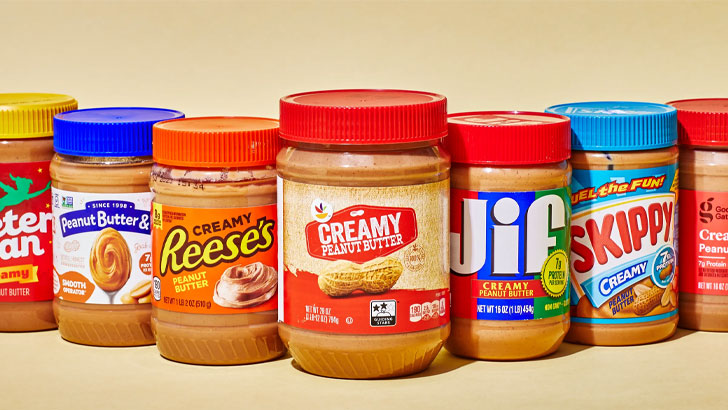 Peanut butter is a popular snack that’s high in protein and calories, making it a great option for those who want to limit their carbohydrate intake. While the fat found in peanut butter is mostly healthy, it’s important to note that peanuts do contain some saturated fat, which can lead to heart issues if consumed in excess over a long period of time. In moderation, peanut butter can be part of a healthy diet. However, excessive consumption of this spread can lead to weight gain and high cholesterol. As with anything, it’s important to avoid overindulging in peanut butter.
Peanut butter is a popular snack that’s high in protein and calories, making it a great option for those who want to limit their carbohydrate intake. While the fat found in peanut butter is mostly healthy, it’s important to note that peanuts do contain some saturated fat, which can lead to heart issues if consumed in excess over a long period of time. In moderation, peanut butter can be part of a healthy diet. However, excessive consumption of this spread can lead to weight gain and high cholesterol. As with anything, it’s important to avoid overindulging in peanut butter.
Roasted Peanuts
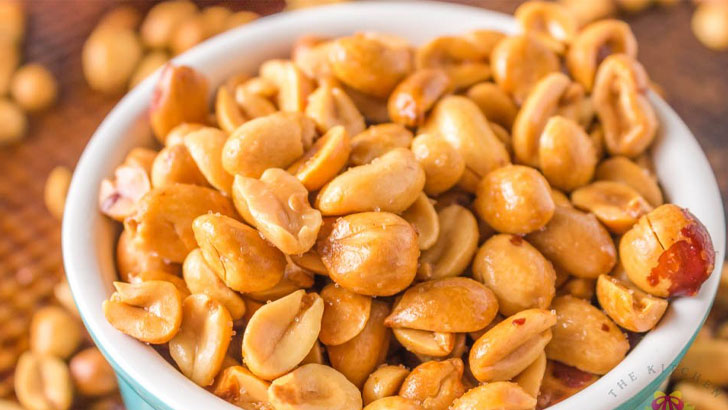 >
Although both roasted and raw nuts are similar in terms of calories, carbs, and protein, there are some differences in their nutritional value. Roasting nuts can add flavor, but it can also damage the healthy fats they contain, reducing their nutritional benefits. Furthermore, roasting nuts can lead to the formation of acrylamide, a harmful substance that forms during high-temperature cooking. Acrylamide exposure in large doses can cause nerve damage, impaired muscle coordination, and muscle weakness. Therefore, it’s important to be cautious and mindful of the way nuts are prepared and consumed. While roasted peanuts may have more flavor than regular peanuts, they may not necessarily be the healthiest option.
>
Although both roasted and raw nuts are similar in terms of calories, carbs, and protein, there are some differences in their nutritional value. Roasting nuts can add flavor, but it can also damage the healthy fats they contain, reducing their nutritional benefits. Furthermore, roasting nuts can lead to the formation of acrylamide, a harmful substance that forms during high-temperature cooking. Acrylamide exposure in large doses can cause nerve damage, impaired muscle coordination, and muscle weakness. Therefore, it’s important to be cautious and mindful of the way nuts are prepared and consumed. While roasted peanuts may have more flavor than regular peanuts, they may not necessarily be the healthiest option.
Artificial Orange Juice
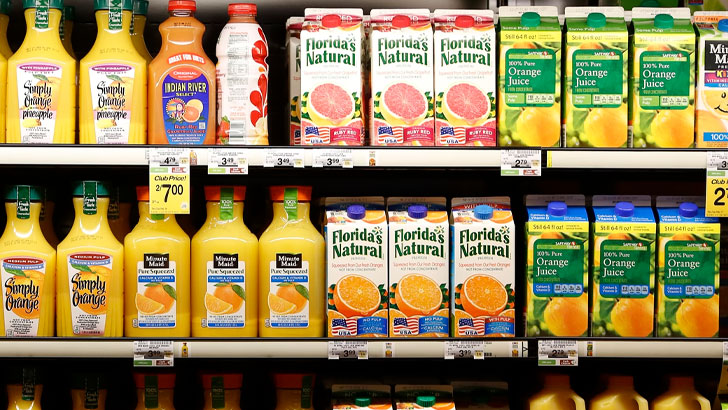 If you’re a fan of artificial orange juice drinks, you might want to reconsider your beverage choice. These drinks are often loaded with sugar, artificial sweeteners, coloring agents, and other additives that offer little to no nutritional value. In fact, they can be even worse for you than regular orange juice, which is already high in sugar and should also be consumed in moderation. It’s clear that while these drinks might be tasty, they’re not doing your body any favors.
If you’re a fan of artificial orange juice drinks, you might want to reconsider your beverage choice. These drinks are often loaded with sugar, artificial sweeteners, coloring agents, and other additives that offer little to no nutritional value. In fact, they can be even worse for you than regular orange juice, which is already high in sugar and should also be consumed in moderation. It’s clear that while these drinks might be tasty, they’re not doing your body any favors.
Instant Mac & Cheese
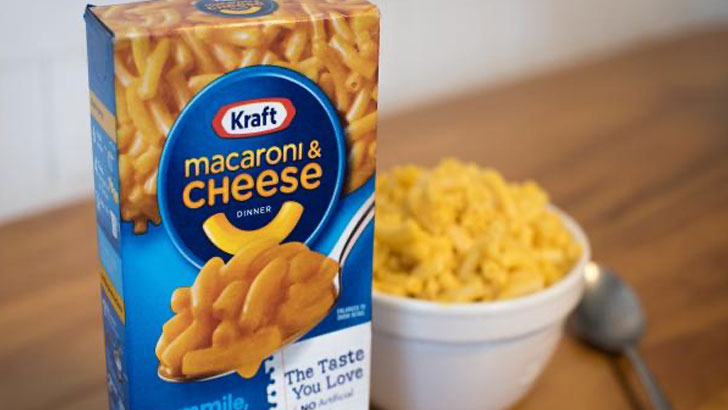 Although instant mac ‘n cheese is convenient and popular among college students and toddlers, it is not without its risks. Eating too much boxed mac ‘n cheese can expose you to harmful chemicals. These microwavable meals contain phthalates, a toxic industrial chemical that can cause harm to the body. According to The New York Daily News, ten different varieties of mac ‘n cheese have been found to contain phthalates. The plastic packaging used in Kraft products appears to be the main source of these harmful chemicals, which leach into the pasta itself. As a result, eight out of nine of Kraft’s familiar blue and orange boxes have been found to contain phthalates.
Although instant mac ‘n cheese is convenient and popular among college students and toddlers, it is not without its risks. Eating too much boxed mac ‘n cheese can expose you to harmful chemicals. These microwavable meals contain phthalates, a toxic industrial chemical that can cause harm to the body. According to The New York Daily News, ten different varieties of mac ‘n cheese have been found to contain phthalates. The plastic packaging used in Kraft products appears to be the main source of these harmful chemicals, which leach into the pasta itself. As a result, eight out of nine of Kraft’s familiar blue and orange boxes have been found to contain phthalates.
Sandwich Cookies
 Sandwich cookies have been a top-selling cookie style worldwide for a while now. However, there is a potential health risk in addition to their high sugar content, and that is the presence of diacetylene. This chemical is used as a flavoring in some sandwich cookie brands and can lead to respiratory problems if consumed in excessive amounts over a long period. Given their high sugar and fat content, these cookies can be addictive, making it challenging to eat just one. To make an informed decision, it’s a good idea to check the ingredients list on the packet before purchasing.
Sandwich cookies have been a top-selling cookie style worldwide for a while now. However, there is a potential health risk in addition to their high sugar content, and that is the presence of diacetylene. This chemical is used as a flavoring in some sandwich cookie brands and can lead to respiratory problems if consumed in excessive amounts over a long period. Given their high sugar and fat content, these cookies can be addictive, making it challenging to eat just one. To make an informed decision, it’s a good idea to check the ingredients list on the packet before purchasing.
Iced Tea
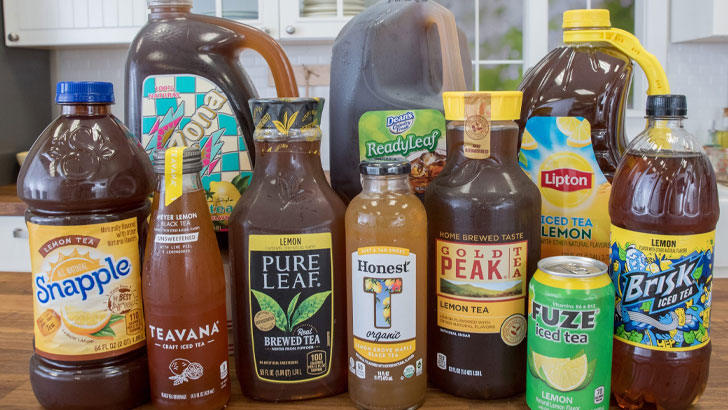 Despite its name and appearance, iced tea may not be as healthy as it seems. Although it is often marketed as a refreshing, natural drink, iced tea can be loaded with sugar, making it more similar to soda than actual tea. In fact, a single bottle of iced tea can contain up to 15 tablespoons of sugar, leading to dangerous insulin spikes and an increased risk of diabetes. If you want to enjoy a healthier version of iced tea, consider brewing your own at home with less sugar or natural sweeteners like honey or stevia.
Despite its name and appearance, iced tea may not be as healthy as it seems. Although it is often marketed as a refreshing, natural drink, iced tea can be loaded with sugar, making it more similar to soda than actual tea. In fact, a single bottle of iced tea can contain up to 15 tablespoons of sugar, leading to dangerous insulin spikes and an increased risk of diabetes. If you want to enjoy a healthier version of iced tea, consider brewing your own at home with less sugar or natural sweeteners like honey or stevia.
White Wine
 Consuming white wine can be enjoyable in moderation, but drinking it daily can have negative consequences. Regular consumption can lead to alcohol addiction and increased tolerance, which could cause the need for higher amounts to achieve satisfaction. White wine can also raise blood pressure and lead to cirrhosis if consumed daily, in addition to negatively affecting fertility. Additionally, each cup of white wine contains around 200 calories, which may not be ideal for those looking to maintain a healthy diet.
Consuming white wine can be enjoyable in moderation, but drinking it daily can have negative consequences. Regular consumption can lead to alcohol addiction and increased tolerance, which could cause the need for higher amounts to achieve satisfaction. White wine can also raise blood pressure and lead to cirrhosis if consumed daily, in addition to negatively affecting fertility. Additionally, each cup of white wine contains around 200 calories, which may not be ideal for those looking to maintain a healthy diet.
Strawberries
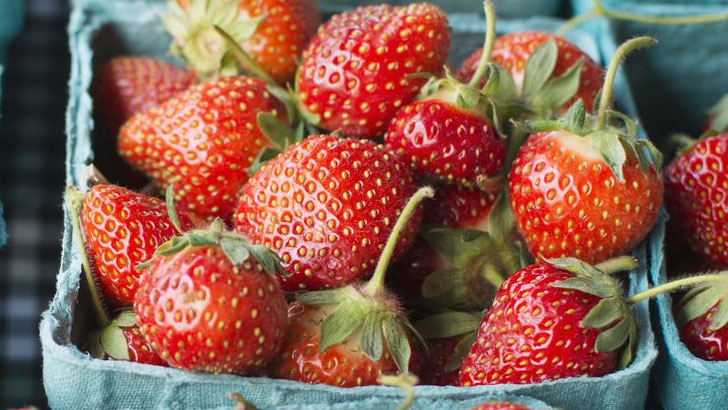 Although strawberries are considered a healthy addition to a diet, it’s important to exercise caution when consuming them due to potential pesticide exposure. As many as 20 different types of pesticides can be used during their cultivation, which can pose a health risk. Since strawberries are typically eaten with their skin, it’s crucial to clean them thoroughly to avoid ingesting these chemicals. Rinsing them with water alone may not be enough, so it’s recommended to use fruit sprays to properly disinfect them before consuming.
Although strawberries are considered a healthy addition to a diet, it’s important to exercise caution when consuming them due to potential pesticide exposure. As many as 20 different types of pesticides can be used during their cultivation, which can pose a health risk. Since strawberries are typically eaten with their skin, it’s crucial to clean them thoroughly to avoid ingesting these chemicals. Rinsing them with water alone may not be enough, so it’s recommended to use fruit sprays to properly disinfect them before consuming.
Pork Rinds
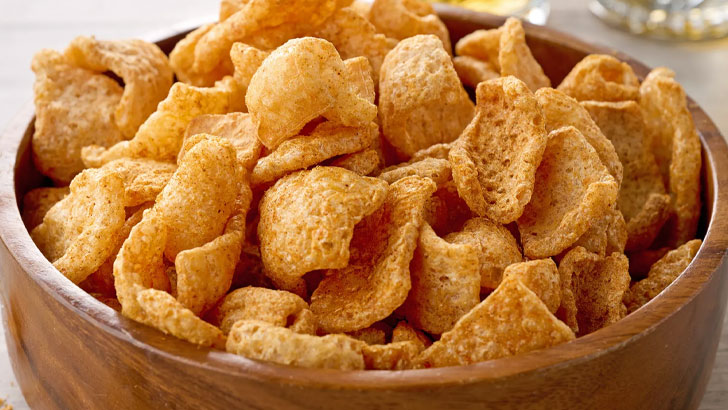 Although pork rinds can fit into a ketogenic diet, they are not a health food. While they may be low in carbohydrates, they are also high in saturated fat, sodium, and calories, which means that consuming large amounts of them regularly can lead to weight gain and increased risk of conditions such as high blood pressure, heart disease, and diabetes. Pork rinds may have a high protein content, but they should be consumed in moderation, rather than as a regular snack option.
Although pork rinds can fit into a ketogenic diet, they are not a health food. While they may be low in carbohydrates, they are also high in saturated fat, sodium, and calories, which means that consuming large amounts of them regularly can lead to weight gain and increased risk of conditions such as high blood pressure, heart disease, and diabetes. Pork rinds may have a high protein content, but they should be consumed in moderation, rather than as a regular snack option.
Tomatoes
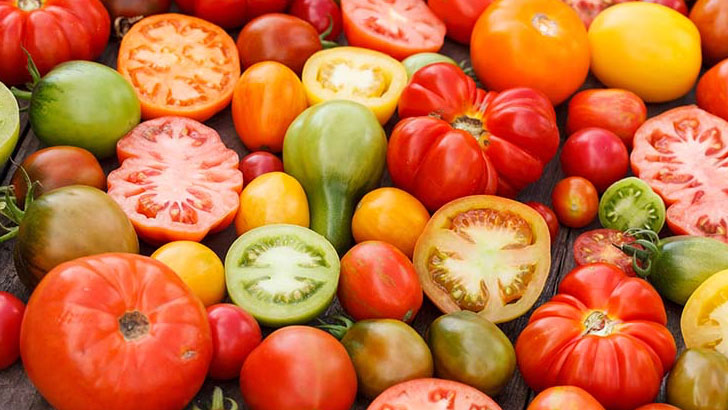 Organic tomatoes are a safer option as conventionally grown tomatoes may contain multiple pesticides that cannot be fully removed by washing or peeling due to their thin skin. In addition to pesticides, tomatoes can pose problems for those with digestive system issues, as they are high in organic acids. People with heartburn are particularly susceptible to discomfort after eating tomatoes.
Organic tomatoes are a safer option as conventionally grown tomatoes may contain multiple pesticides that cannot be fully removed by washing or peeling due to their thin skin. In addition to pesticides, tomatoes can pose problems for those with digestive system issues, as they are high in organic acids. People with heartburn are particularly susceptible to discomfort after eating tomatoes.
Refried Beans
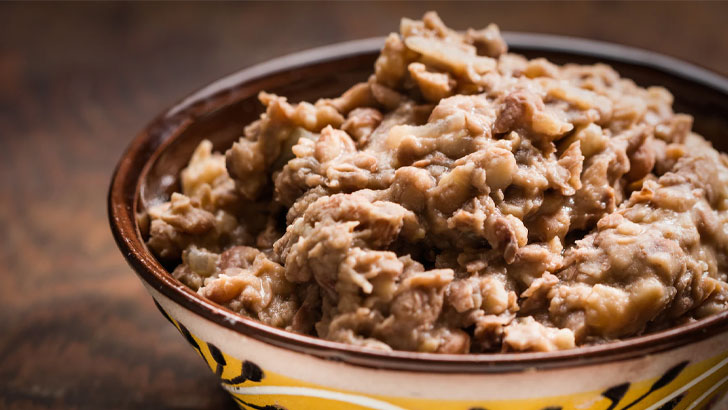 While homemade beans are a healthy food, the processed version of beans, such as refried beans, is not as healthy. Although processed beans are practical and versatile, they are high in sodium and saturated fat, which can lead to various health problems, including hypertension, obesity, and high cholesterol. Some studies have suggested that a diet high in these unhealthy ingredients may also increase the risk of cancer.
While homemade beans are a healthy food, the processed version of beans, such as refried beans, is not as healthy. Although processed beans are practical and versatile, they are high in sodium and saturated fat, which can lead to various health problems, including hypertension, obesity, and high cholesterol. Some studies have suggested that a diet high in these unhealthy ingredients may also increase the risk of cancer.
Chips
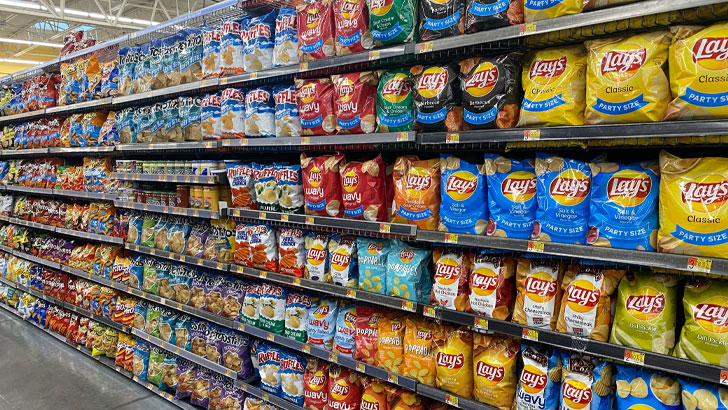 Potato chips and French fries may be a tasty snack, but they are not the healthiest food choices. Most potato chips contain petroleum-based colorings, starches, preservatives, and saturated fat. In addition, consuming just 0.11 pounds of potato chips in one serving provides 32% of the recommended daily value for sodium. French fries are also not a better option, as they contain monosodium glutamate, which enhances the flavor but makes you want to keep eating more. This is why the tagline, “you can’t eat just one” holds true.
Potato chips and French fries may be a tasty snack, but they are not the healthiest food choices. Most potato chips contain petroleum-based colorings, starches, preservatives, and saturated fat. In addition, consuming just 0.11 pounds of potato chips in one serving provides 32% of the recommended daily value for sodium. French fries are also not a better option, as they contain monosodium glutamate, which enhances the flavor but makes you want to keep eating more. This is why the tagline, “you can’t eat just one” holds true.
Sunflower Seeds
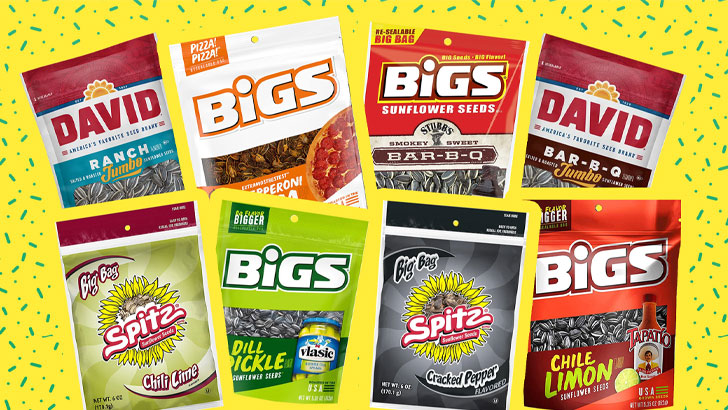 While sunflower seeds have been marketed as a healthy snack option, overindulging in them can still lead to a high caloric intake and eventual weight gain. In addition, consuming excessive amounts of sunflower seeds can result in a high sodium intake. Furthermore, a 2017 study revealed that sunflower seeds were identified as a source of toxic mold, which produces harmful toxins that can act as a powerful liver carcinogen. Consumption of sunflower seeds containing these toxins can lead to increased health risks.
While sunflower seeds have been marketed as a healthy snack option, overindulging in them can still lead to a high caloric intake and eventual weight gain. In addition, consuming excessive amounts of sunflower seeds can result in a high sodium intake. Furthermore, a 2017 study revealed that sunflower seeds were identified as a source of toxic mold, which produces harmful toxins that can act as a powerful liver carcinogen. Consumption of sunflower seeds containing these toxins can lead to increased health risks.
Tortillas
 Tortillas, a popular carbohydrate-based food worldwide, are best consumed in moderation due to their high caloric content. Flour tortillas, in particular, are not the healthiest option as they often contain preservatives and additives used to prolong their shelf life, which can negatively impact the body. Additionally, they can be high in sodium. Corn tortillas or homemade ones are a better alternative as they are usually free from additives and preservatives. They are also relatively affordable and can be found in stores such as Target.
Tortillas, a popular carbohydrate-based food worldwide, are best consumed in moderation due to their high caloric content. Flour tortillas, in particular, are not the healthiest option as they often contain preservatives and additives used to prolong their shelf life, which can negatively impact the body. Additionally, they can be high in sodium. Corn tortillas or homemade ones are a better alternative as they are usually free from additives and preservatives. They are also relatively affordable and can be found in stores such as Target.
Canned Tuna
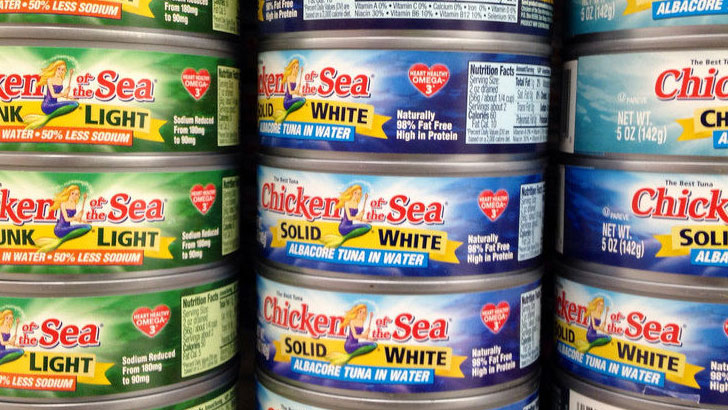 Tuna is often recommended by nutritionists as a weight loss food due to its high protein and low carbohydrate content. However, before making it a daily staple, it is important to consider that canned tuna may contain mercury. Even small amounts of this toxic substance can cause problems for the nervous, immune, and digestive systems. Therefore, it is recommended to consume tuna in moderation and opt for fresh, low-mercury alternatives when possible.
Tuna is often recommended by nutritionists as a weight loss food due to its high protein and low carbohydrate content. However, before making it a daily staple, it is important to consider that canned tuna may contain mercury. Even small amounts of this toxic substance can cause problems for the nervous, immune, and digestive systems. Therefore, it is recommended to consume tuna in moderation and opt for fresh, low-mercury alternatives when possible.
Chocolate Milk
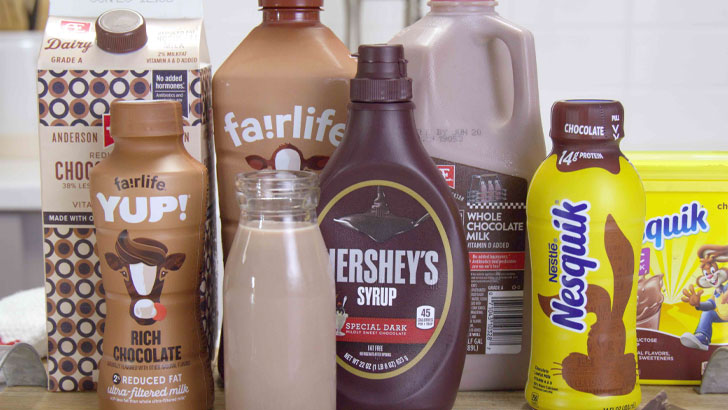 While chocolate milk can be a tasty beverage and a good source of calcium, protein, and Vitamin D, overconsumption of this high-sugar drink can lead to an increased risk of weight gain and chronic diseases. Despite its nutritional benefits, drinking too much chocolate milk can be harmful, as it contains almost as much sugar as a cup of soda and quite a few calories. With one-third of U.S. children being overweight or obese, it’s a drink choice that parents should consider avoiding for their kids, and individuals should consume in moderation.
While chocolate milk can be a tasty beverage and a good source of calcium, protein, and Vitamin D, overconsumption of this high-sugar drink can lead to an increased risk of weight gain and chronic diseases. Despite its nutritional benefits, drinking too much chocolate milk can be harmful, as it contains almost as much sugar as a cup of soda and quite a few calories. With one-third of U.S. children being overweight or obese, it’s a drink choice that parents should consider avoiding for their kids, and individuals should consume in moderation.
Artificial Creamer
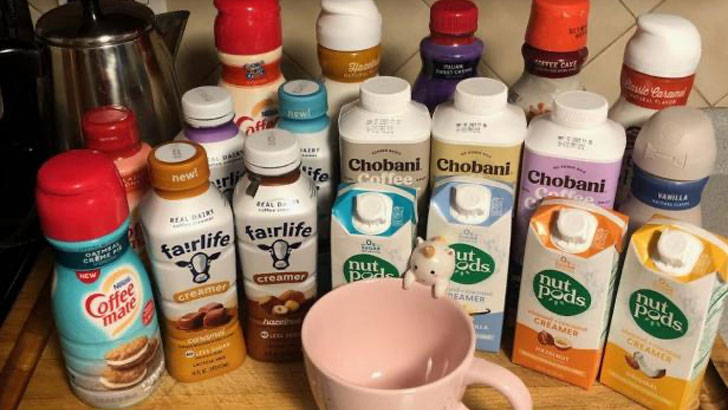 Many people rely on a cup of coffee in the morning to jump-start their day, but to make it more palatable, creamer is often added. However, artificially-flavored creamers are widely available in the market, offering a range of flavors from regular vanilla to White Chocolate Raspberry. While a little creamer is harmless, adding too much of it can increase your sugar intake. Moreover, the artificial flavorings used in these creamers can cause food hypersensitivity, abdominal pain, and other adverse effects depending on the specific flavorings used by the manufacturer.
Many people rely on a cup of coffee in the morning to jump-start their day, but to make it more palatable, creamer is often added. However, artificially-flavored creamers are widely available in the market, offering a range of flavors from regular vanilla to White Chocolate Raspberry. While a little creamer is harmless, adding too much of it can increase your sugar intake. Moreover, the artificial flavorings used in these creamers can cause food hypersensitivity, abdominal pain, and other adverse effects depending on the specific flavorings used by the manufacturer.
Granola Bars
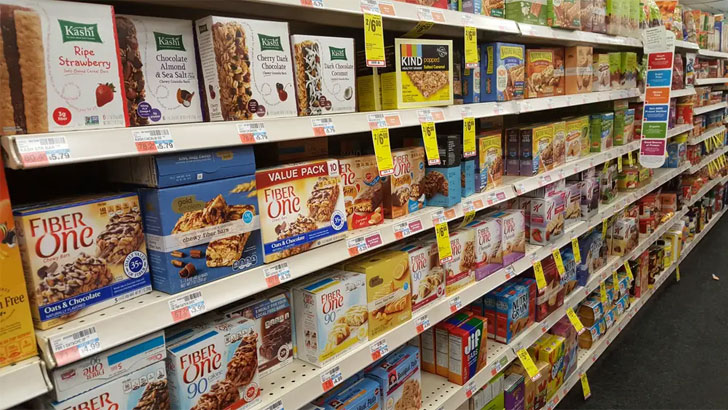 Despite their reputation for being healthy, granola bars may not be as good for you as advertised. Advertisements often use nature-related or exercise-themed scenes to promote the product, leading consumers to believe that they are a healthy snack option. However, many granola bars contain ingredients that could be detrimental to your health. These bars often have high amounts of refined sugars and rarely include significant amounts of fruit. Generally, the fewer ingredients a granola bar has, the more likely it is to be healthy.
Despite their reputation for being healthy, granola bars may not be as good for you as advertised. Advertisements often use nature-related or exercise-themed scenes to promote the product, leading consumers to believe that they are a healthy snack option. However, many granola bars contain ingredients that could be detrimental to your health. These bars often have high amounts of refined sugars and rarely include significant amounts of fruit. Generally, the fewer ingredients a granola bar has, the more likely it is to be healthy.
Sparkling Water
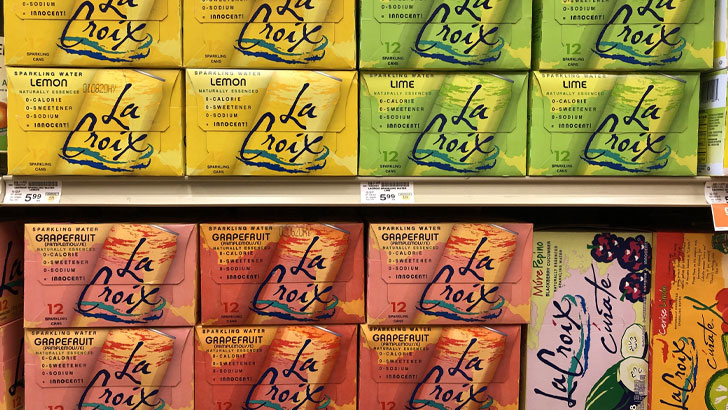 Per- and polyfluoroalkyl chemicals (PFAS), which are man-made and used in everything from stain-resistant fabrics to food packaging, have been around since the 1940s. The EPA has linked PFAS chemicals to health issues such as thyroid disruption, cancer, and low birth weight. Despite not being federally regulated, some sparkling mineral water brands have been found to contain measurable amounts of PFAS chemicals. This could be due to high levels of PFAS in the source water or the carbonation process. It’s important to be aware of the potential health risks associated with PFAS chemicals and to choose mineral water brands that are tested and have lower levels of these chemicals.
Per- and polyfluoroalkyl chemicals (PFAS), which are man-made and used in everything from stain-resistant fabrics to food packaging, have been around since the 1940s. The EPA has linked PFAS chemicals to health issues such as thyroid disruption, cancer, and low birth weight. Despite not being federally regulated, some sparkling mineral water brands have been found to contain measurable amounts of PFAS chemicals. This could be due to high levels of PFAS in the source water or the carbonation process. It’s important to be aware of the potential health risks associated with PFAS chemicals and to choose mineral water brands that are tested and have lower levels of these chemicals.
Frozen Vegetables
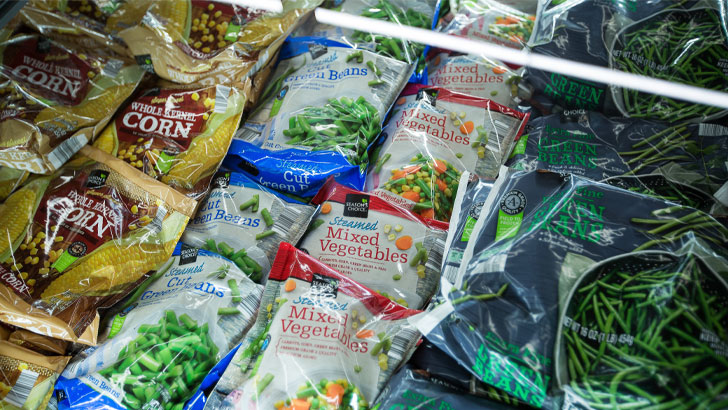 Although frozen vegetables are still a healthy option, it’s important to note that they may not provide as many nutrients as their fresh counterparts. Freezing does retain some nutritional value, but not all of it, so you may need to consume more frozen vegetables to get the same nutrients as non-frozen ones. It’s also essential to keep in mind that if vegetables have been frozen for more than a year, the nutrients start to break down, and minerals and vitamins are lost during the blanching process. In reality, the blanching process is when the majority of the nutritional loss occurs. As a result, if you have frozen veggies, it’s best to eat them quickly and in large quantities.
Although frozen vegetables are still a healthy option, it’s important to note that they may not provide as many nutrients as their fresh counterparts. Freezing does retain some nutritional value, but not all of it, so you may need to consume more frozen vegetables to get the same nutrients as non-frozen ones. It’s also essential to keep in mind that if vegetables have been frozen for more than a year, the nutrients start to break down, and minerals and vitamins are lost during the blanching process. In reality, the blanching process is when the majority of the nutritional loss occurs. As a result, if you have frozen veggies, it’s best to eat them quickly and in large quantities.
Margarine
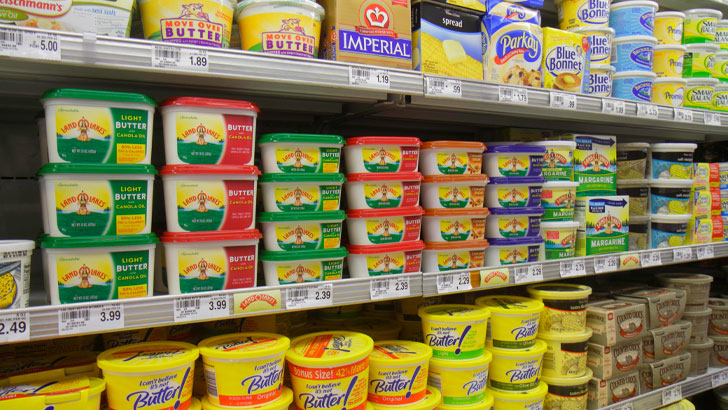 Originally created as a more affordable alternative to butter, margarine has only a small amount of cow’s milk and some brands even exclude animal-based ingredients. However, rather than cow’s milk fat, margarine is typically made from various vegetable oils which result in high levels of trans fat. Consuming margarine with high trans fat content can increase the risk of developing severe conditions like heart disease, cancer, and diabetes.
Originally created as a more affordable alternative to butter, margarine has only a small amount of cow’s milk and some brands even exclude animal-based ingredients. However, rather than cow’s milk fat, margarine is typically made from various vegetable oils which result in high levels of trans fat. Consuming margarine with high trans fat content can increase the risk of developing severe conditions like heart disease, cancer, and diabetes.
Donuts
 Donuts are a beloved treat with a wide range of flavors and toppings available to suit any taste. However, despite their popularity, donuts are not the healthiest snack option. In addition to their high sugar content, the fact that they are fried means they often contain trans fats, which have been linked to a range of health issues including diabetes, cancer, and heart disease. For those looking to maintain a healthy diet, it’s best to enjoy donuts in moderation and consider healthier snack options as well.
Donuts are a beloved treat with a wide range of flavors and toppings available to suit any taste. However, despite their popularity, donuts are not the healthiest snack option. In addition to their high sugar content, the fact that they are fried means they often contain trans fats, which have been linked to a range of health issues including diabetes, cancer, and heart disease. For those looking to maintain a healthy diet, it’s best to enjoy donuts in moderation and consider healthier snack options as well.
Fried Chicken
 When it comes to fried chicken, it’s important to remember that it should be eaten in moderation due to the fact that it’s fried in oil. In addition to being fried, this dish is also made with a lot of flour, making it high in calories. Consuming too many calories can lead to health issues such as diabetes, heart disease, and being overweight. If you want to enjoy chicken, grilling it may be a healthier option.
When it comes to fried chicken, it’s important to remember that it should be eaten in moderation due to the fact that it’s fried in oil. In addition to being fried, this dish is also made with a lot of flour, making it high in calories. Consuming too many calories can lead to health issues such as diabetes, heart disease, and being overweight. If you want to enjoy chicken, grilling it may be a healthier option.
Prepackaged Hamburgers
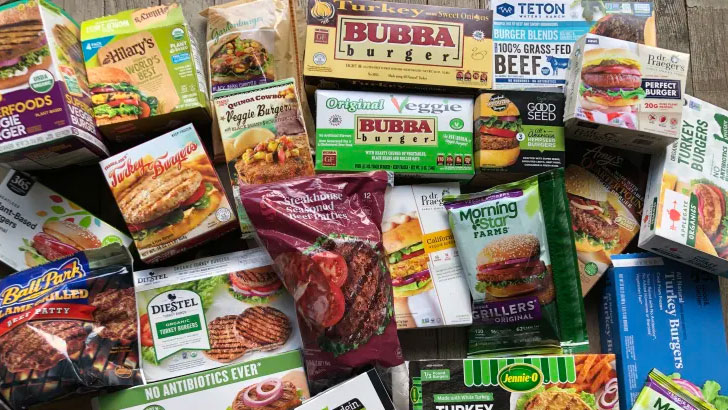 Pre-packaged burgers are a popular choice for their affordability, but their low price comes with a hidden cost. Because they are pre-packaged, the quality of the meat used is often questionable, allowing companies to cut production costs. Many pre-packaged burgers are labeled as containing only a certain percentage of “meat,” with the rest being made up of other substances such as soy or animal hides. These non-meat ingredients are often not listed on the label, making it difficult for consumers to know exactly what they are eating.
Pre-packaged burgers are a popular choice for their affordability, but their low price comes with a hidden cost. Because they are pre-packaged, the quality of the meat used is often questionable, allowing companies to cut production costs. Many pre-packaged burgers are labeled as containing only a certain percentage of “meat,” with the rest being made up of other substances such as soy or animal hides. These non-meat ingredients are often not listed on the label, making it difficult for consumers to know exactly what they are eating.
Pre-Cut Watermelon
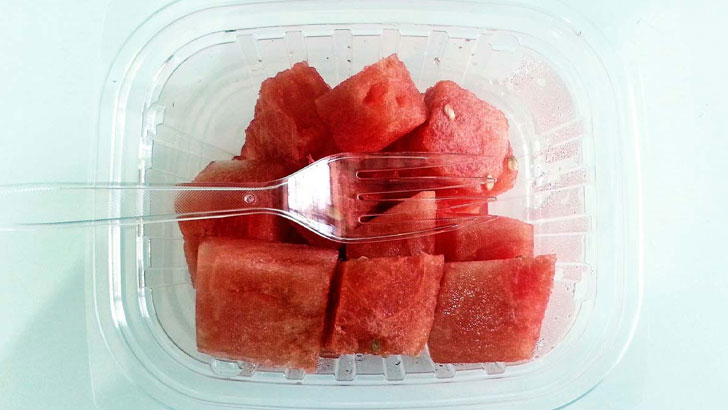 While there is no evidence that watermelon can cause diseases like yellow fever or typhus, its consumption can be associated with certain conditions, particularly if it’s pre-cut in the supermarket. The issue with pre-cut watermelon is that it may be contaminated with bacteria that can lead to salmonellosis, a type of food poisoning. In fact, in 2019, there was an outbreak of salmonella illness linked to pre-cut watermelon. Thus, it is safer to buy the whole fruit and cut it at home to reduce the risk of foodborne illness.
While there is no evidence that watermelon can cause diseases like yellow fever or typhus, its consumption can be associated with certain conditions, particularly if it’s pre-cut in the supermarket. The issue with pre-cut watermelon is that it may be contaminated with bacteria that can lead to salmonellosis, a type of food poisoning. In fact, in 2019, there was an outbreak of salmonella illness linked to pre-cut watermelon. Thus, it is safer to buy the whole fruit and cut it at home to reduce the risk of foodborne illness.
Potatoes
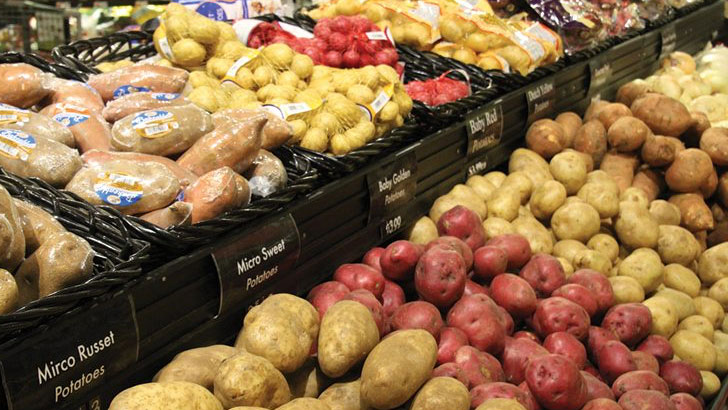 Potatoes, like other vegetables, can be contaminated with dangerous pesticides. However, that is not the only hazard associated with these tubers. You may have noticed that old potatoes start to turn green. This discoloration is due to the buildup of glycoalkaloids, which can cause moderate to severe food poisoning. It is best not to eat potatoes that have turned green. Another warning sign to watch for is if the potatoes taste bitter, as this is also an indication of the presence of glycoalkaloids.
Potatoes, like other vegetables, can be contaminated with dangerous pesticides. However, that is not the only hazard associated with these tubers. You may have noticed that old potatoes start to turn green. This discoloration is due to the buildup of glycoalkaloids, which can cause moderate to severe food poisoning. It is best not to eat potatoes that have turned green. Another warning sign to watch for is if the potatoes taste bitter, as this is also an indication of the presence of glycoalkaloids.
Agave
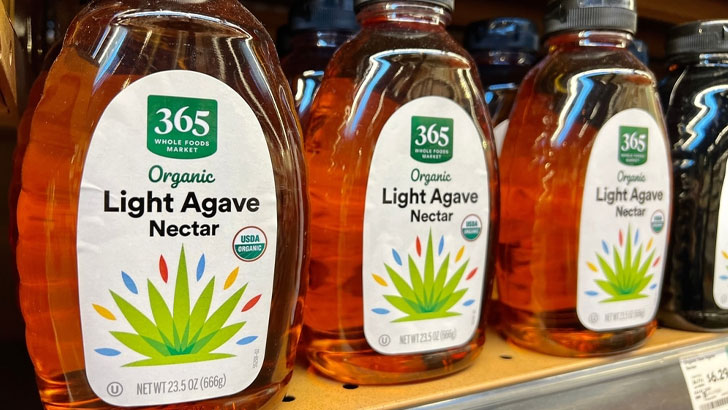 Agave nectar is often marketed as a healthier substitute for refined sugar or other syrups. However, it is important to note that agave nectar has a similar sugar content to many other sweeteners, and in some cases, it may even contain more sugar. For instance, a tablespoon of refined sugar contains 40 calories, whereas the same amount of agave nectar contains 60 calories. Additionally, agave nectar is high in fructose, which can lead to the accumulation of fat in the liver and an increase in LDL cholesterol.
Agave nectar is often marketed as a healthier substitute for refined sugar or other syrups. However, it is important to note that agave nectar has a similar sugar content to many other sweeteners, and in some cases, it may even contain more sugar. For instance, a tablespoon of refined sugar contains 40 calories, whereas the same amount of agave nectar contains 60 calories. Additionally, agave nectar is high in fructose, which can lead to the accumulation of fat in the liver and an increase in LDL cholesterol.
Sausages
 Sausages offer a wide range of cooking and eating options, but they are not a good choice for a healthy diet due to their high saturated fat content. In addition, sausages are known to have alarming levels of sodium and nitrates, which have been linked to cancer. Overconsumption of sausages can lead to obesity, heart attacks, and strokes.
Sausages offer a wide range of cooking and eating options, but they are not a good choice for a healthy diet due to their high saturated fat content. In addition, sausages are known to have alarming levels of sodium and nitrates, which have been linked to cancer. Overconsumption of sausages can lead to obesity, heart attacks, and strokes.
Onions
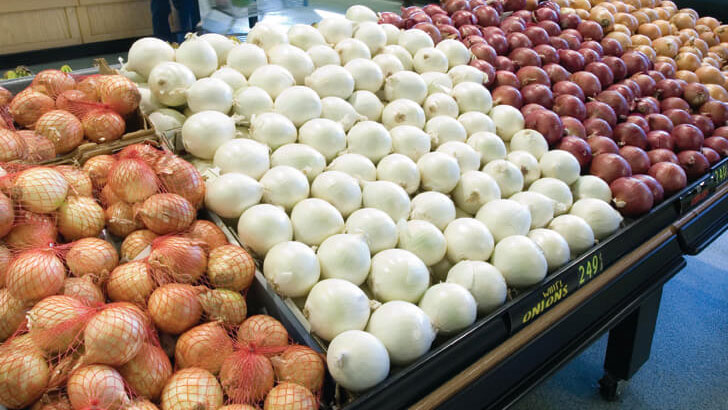 While onions have some health benefits, they may not be suitable for everyone. Onions contain sulfuric compounds and antioxidants, which have been linked to reduced cancer risk, lower blood sugar levels, and bone health improvements, according to Healthline. However, onions are highly acidic, which can be problematic for individuals with heartburn, gout, colitis, acid reflux ulcers, intestinal inflammation, and rosacea. Additionally, onion sensitivity or intolerance is common.
While onions have some health benefits, they may not be suitable for everyone. Onions contain sulfuric compounds and antioxidants, which have been linked to reduced cancer risk, lower blood sugar levels, and bone health improvements, according to Healthline. However, onions are highly acidic, which can be problematic for individuals with heartburn, gout, colitis, acid reflux ulcers, intestinal inflammation, and rosacea. Additionally, onion sensitivity or intolerance is common.
Energy Drinks
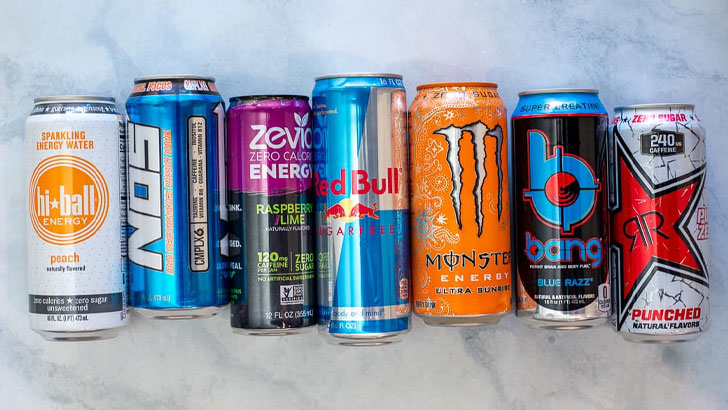 Energy drinks are a popular go-to for those needing a quick boost of energy, but consuming these beverages may do more harm than good. Energy drinks typically contain caffeine, taurine, and sugars, which are all stimulants and can cause a range of negative side effects such as headaches, nausea, dizziness, and diarrhea. If consumed in large amounts, they can lead to more serious problems like changes in heart rate and blood pressure. Energy drinks have also been known to worsen anxiety and can even be addictive, according to Addiction Helper. It may be wise to reconsider relying on energy drinks as a regular part of your diet.
Energy drinks are a popular go-to for those needing a quick boost of energy, but consuming these beverages may do more harm than good. Energy drinks typically contain caffeine, taurine, and sugars, which are all stimulants and can cause a range of negative side effects such as headaches, nausea, dizziness, and diarrhea. If consumed in large amounts, they can lead to more serious problems like changes in heart rate and blood pressure. Energy drinks have also been known to worsen anxiety and can even be addictive, according to Addiction Helper. It may be wise to reconsider relying on energy drinks as a regular part of your diet.
Dried Fruit
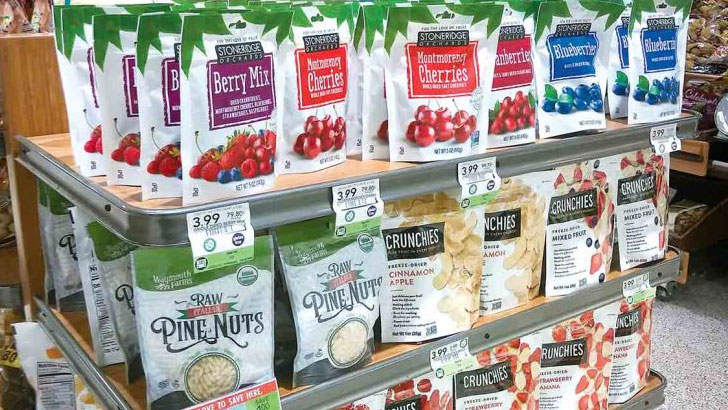 Dried fruit can be deceiving when it comes to nutritional value. Although it contains nutrients similar to fresh fruit, the dehydration process can diminish some of these benefits. Vitamin C, for instance, is very sensitive to heat and oxidation and can be lost during drying. Moreover, dehydration shrinks the weight and size of the fruit, making it easier to consume excessive amounts. While dried fruit can make for a great snack, it’s crucial to be aware of its nutritional content and inspect the label for added sugars. Even bags labeled as “unsweetened” may still contain significant amounts of sugar.
Dried fruit can be deceiving when it comes to nutritional value. Although it contains nutrients similar to fresh fruit, the dehydration process can diminish some of these benefits. Vitamin C, for instance, is very sensitive to heat and oxidation and can be lost during drying. Moreover, dehydration shrinks the weight and size of the fruit, making it easier to consume excessive amounts. While dried fruit can make for a great snack, it’s crucial to be aware of its nutritional content and inspect the label for added sugars. Even bags labeled as “unsweetened” may still contain significant amounts of sugar.
More From Auto Overload
-


The Most Expensive Auction Items Ever Sold
-


Amazing Wild West Hygiene Practices
-


The Fastest Growing Cities In The U.S.
-


The Wealthiest Heiresses Live Truly Enviable Lives
-


Everything Netflix is Canceling in 2023
-


Rare Photos From The Past
-


Most Epic Construction Mishaps Ever
-


Car Cleaning Hacks To Save You Money
-


Obama’s Post Presidency Adventures
-


Incredible Photos From Burning Man Festival
-


Airport Tips Every Traveler Should Know
-


Dog Breeds Not Meant For Your Home


6 Popular Car Features That Will Never Be Seen Again
Venturing into the market for a new car after some time can be overwhelming, given the rapid advancements in vehicle...


6 Best High Mileage Motor Oils On The Market
As vehicles age and accumulate miles, the demand for high-mileage motor oils grows significantly. These specialized lubricants are formulated to...


8 Easy Ways To Increase Your Car’s Value
If you’ve been contemplating selling or trading in your car, there are simple yet effective ways to enhance its value...


10 Common Car Problems Every Driver Should Be Aware Of
While many of us rely on our cars for daily transportation, we often do so without fully understanding the subtle...

